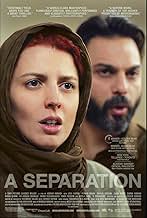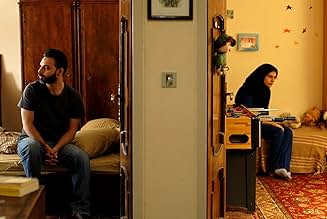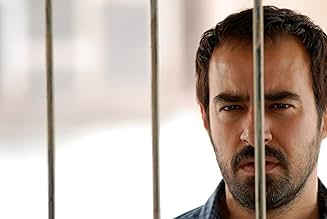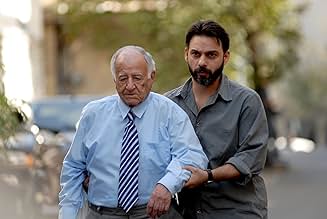A married couple are faced with a difficult decision - to improve the life of their child by moving to another country or to stay in Iran and look after a deteriorating parent who has Alzhei... Read allA married couple are faced with a difficult decision - to improve the life of their child by moving to another country or to stay in Iran and look after a deteriorating parent who has Alzheimer's disease.A married couple are faced with a difficult decision - to improve the life of their child by moving to another country or to stay in Iran and look after a deteriorating parent who has Alzheimer's disease.
- Won 1 Oscar
- 89 wins & 52 nominations total
Payman Maadi
- Nader
- (as Peyman Moadi)
- Director
- Writer
- All cast & crew
- Production, box office & more at IMDbPro
Summary
Reviewers say 'A Separation' delves into family, duty, societal expectations, and complex human relationships, exploring moral dilemmas, class distinctions, and cultural norms. It portrays intense emotions like tension, frustration, love, and betrayal through realistic interactions. The narrative is lauded for its complexity, presenting ambiguous moral questions without clear 'good' or 'bad' characters. The film is frequently praised for evoking deep emotional responses and provoking thought on universal human experiences.
Featured reviews
10jsrees
This is the first Iranian film I've seen, and I'm recommending it to every-one I know. It is so well-crafted; the twists of the plot throw up new moral dilemmas for all the protagonists, which are explored sensitively and without judgement - so refreshingly unlike mainstream American films. I felt sympathy for all the characters, even the threatening Hodjat, full of misplaced rage which often erupts volcanically. And as a footnote, the film felt like an intimate view into a society that our news media portray as monochromatic and extremely foreign. (I am writing this a few days after the UK embassy in Tehran was ransacked)
Today I had the pleasure of watching A Separation, a foreign film that has been critically-acclaimed for some time now. What we have here is definitely one of the year's best films. Intriguing, captivating, and ambiguous.
I had no idea that this was going to turn out to be some sort of court drama. I just want to first talk about the direction. Farhadi masterfully constructs these characters, and we enter into a state in their lives where we serve as some sort of observant. Even before the actual plot of the film comes along, his tight screenplay and direction leave us trying to astutely observe what is happening around every corner of the frame. We barely know these characters, and yet, tension is arising from the simplest of every-day matters. Why? Why indeed, as it becomes apparent, the film gets more serious in its plot. It is here that the real reason as to why we are observing moments of these characters' lives comes into focus. Questions arise, as to who did what, and who saw what, and who heard this or that. The film takes a neutral ground in all of this, and yet we ourselves can't help but try to memorize even the smallest of details that could perhaps help us out in figuring out the actual truth. The film never judges its characters, which is why we also have to be sort of neutral in all of this, even when we don't want to, even when we think we know what really happened. This is a mystery in the most unusual and most natural way. We are hooked into the film's plot line, and as much as the film won't let us go, we don't want to let go. We want to hang on and catch up with it, and not miss one single beat of what is happening. Such precise and balanced filmmaking.
I do want to take note of the fantastic performances. The entire cast is wonderful, especially the three main leads. Not one single moment is wasted in their portrayals. Overall, this is a near-perfect film, one of the most intriguing and engaging films of the year, and the ending serves entirely to what had come before, and is fully satisfying.
I had no idea that this was going to turn out to be some sort of court drama. I just want to first talk about the direction. Farhadi masterfully constructs these characters, and we enter into a state in their lives where we serve as some sort of observant. Even before the actual plot of the film comes along, his tight screenplay and direction leave us trying to astutely observe what is happening around every corner of the frame. We barely know these characters, and yet, tension is arising from the simplest of every-day matters. Why? Why indeed, as it becomes apparent, the film gets more serious in its plot. It is here that the real reason as to why we are observing moments of these characters' lives comes into focus. Questions arise, as to who did what, and who saw what, and who heard this or that. The film takes a neutral ground in all of this, and yet we ourselves can't help but try to memorize even the smallest of details that could perhaps help us out in figuring out the actual truth. The film never judges its characters, which is why we also have to be sort of neutral in all of this, even when we don't want to, even when we think we know what really happened. This is a mystery in the most unusual and most natural way. We are hooked into the film's plot line, and as much as the film won't let us go, we don't want to let go. We want to hang on and catch up with it, and not miss one single beat of what is happening. Such precise and balanced filmmaking.
I do want to take note of the fantastic performances. The entire cast is wonderful, especially the three main leads. Not one single moment is wasted in their portrayals. Overall, this is a near-perfect film, one of the most intriguing and engaging films of the year, and the ending serves entirely to what had come before, and is fully satisfying.
If mainstream cinema leaves you soulless, see this film.
If you have a modicum of intelligence, see this film.
If you like great acting and directing, see this film.
If you like great writing and editing, see this film.
If you have an interest in law, see this film.
If you are a parent, see this film.
A Separation is not harrowing or depressing. Fear not as I did before. If you don't like subtitles, you will forget they are there. Do not read any more detailed reviews. Go without preconception. A Separation deserves all the plaudits it is getting and deserves a much wider audience. Minimalistic and economic, a Separation is one of the finest, most chiselled pieces of cinema of this millennium.
If you have a modicum of intelligence, see this film.
If you like great acting and directing, see this film.
If you like great writing and editing, see this film.
If you have an interest in law, see this film.
If you are a parent, see this film.
A Separation is not harrowing or depressing. Fear not as I did before. If you don't like subtitles, you will forget they are there. Do not read any more detailed reviews. Go without preconception. A Separation deserves all the plaudits it is getting and deserves a much wider audience. Minimalistic and economic, a Separation is one of the finest, most chiselled pieces of cinema of this millennium.
this is one of the most heart breaking and real movies I have seen this year. you can not leave the movie for even 1 second and characters are such real ones that you start to put yourself in their position and think what would I do? it is a must see movie as Turkish drama lover person i may suggest every drama fan to watch this breath taking real natural real movie. these Iranian people are god's blessings bravo... the actor is like born to act as if he is living his real life. the relationship between daughter and father and wife and husband seem so natural for those who know that culture. I should also add that the performance of the cleaner woman is very satisfactory.
10Radu_A
Asghar Farhadi's new film after the ingenious 'About Elly' is running for the Golden Bear at this year's Berlin Film Festival and, with half of the competition done and the rest of the program not looking too promising, appears to be an almost inevitable winner. Although maybe it won't for that very reason: Jahar Panahi's repeat inability to attend his jury duties because of Iran's government refusal to issue him a travel permit, a retrospective of his works including the 2006 Silver Bear-winning 'Offside', a variety of other Iranian productions and renewed demonstrations in Iran proper put the spotlight firmly on that country's elaborate, yet constrained film industry. All that buzz may outshine the film's artistic value, and prompt the jury to go for a less favored competitor. I should hope not, for Farhadi manages once again to embed lots of social criticism into a straight-laced, realistic narrative.
As in 'About Elly', the story begins rather unassumingly and takes an abrupt turn into a spiral of increasingly dramatic events: Nader and Simin are a couple about to break up over the question of moving abroad, for which they have obtained a permit after waiting for 18 months. Nader, however, has his father to take care of, who is suffering from Alzheimer's. Sirin still wants to leave, but not without her daughter (yes, pun intended) Termeh, a somewhat shy, bespectacled 11-year-old who cannot accept her parents' break-up. She therefore decides to stay with her father, which prompts Simin not to leave the country, but move to her mother. Nader is thereby forced to hire someone to take care of his dad, and a colleague of Sirin recommends the pregnant Razieh. Being deeply religious, she should not work in a single man's household, but her husband has been out of a job for a long time and is threatened with jail by his creditors. Her pregnancy and the necessity to attend to her daughter additionally stress her out. When Nader comes home one day to find his father left alone and tied to his bed, a struggle with the returning Razieh ensues, with catastrophic consequences for everyone around...
This is a much more complicated set-up than in 'About Elly', but it allows Farhadi to put a lot of additional information into his film as may be obvious to those who are just trying to follow the story (I hesitate to give examples because the film is as of yet to be released in Iran, which means an open-source comment such as this one needs to be carefully phrased). Much of the action takes place in courtrooms, where judges try to negotiate between the parties without any lawyers present. There's a lot of familiarity, and also a lot of menace, which succeeds to create the same climate of anxiety, accusation and deceit as in 'About Elly'. The realism of the narrative is embedded into a carefully planned scenography which makes almost every shot linger in the memory. And as in 'About Elly' the decisive moment, the one that solves the mystery is omitted in the picture, only to be explained verbally at the very end.
What makes me feel even more for this film is the fact that it might be the last film of its kind from Iran for some time. Ali Samadi Ahadi, the German-Iranian director of the comedy 'Salami Aleikum' and the upcoming documentary on the July 2009 protests 'The Green Wave', wrote that the film industry has come to a virtual standstill. 'Nader and Simin' was in development at the time of the protests; since then, regulations have become far more repressive, with even established masters like Kiarostami or Makhmalbaf forced to work abroad, and others threatened with jail and work prohibitions, of whom Panahi is only the most famous example. All the more reason to give this film the credit it deserves - winning Berlin may cause Iran's bureaucrats to reconsider, for cinema is almost the last link remaining to our world. Without film, how could we understand that Iranians are a modern people with issues like our own, and not dangerous fanatics as some media and politicians would have us believe?
As in 'About Elly', the story begins rather unassumingly and takes an abrupt turn into a spiral of increasingly dramatic events: Nader and Simin are a couple about to break up over the question of moving abroad, for which they have obtained a permit after waiting for 18 months. Nader, however, has his father to take care of, who is suffering from Alzheimer's. Sirin still wants to leave, but not without her daughter (yes, pun intended) Termeh, a somewhat shy, bespectacled 11-year-old who cannot accept her parents' break-up. She therefore decides to stay with her father, which prompts Simin not to leave the country, but move to her mother. Nader is thereby forced to hire someone to take care of his dad, and a colleague of Sirin recommends the pregnant Razieh. Being deeply religious, she should not work in a single man's household, but her husband has been out of a job for a long time and is threatened with jail by his creditors. Her pregnancy and the necessity to attend to her daughter additionally stress her out. When Nader comes home one day to find his father left alone and tied to his bed, a struggle with the returning Razieh ensues, with catastrophic consequences for everyone around...
This is a much more complicated set-up than in 'About Elly', but it allows Farhadi to put a lot of additional information into his film as may be obvious to those who are just trying to follow the story (I hesitate to give examples because the film is as of yet to be released in Iran, which means an open-source comment such as this one needs to be carefully phrased). Much of the action takes place in courtrooms, where judges try to negotiate between the parties without any lawyers present. There's a lot of familiarity, and also a lot of menace, which succeeds to create the same climate of anxiety, accusation and deceit as in 'About Elly'. The realism of the narrative is embedded into a carefully planned scenography which makes almost every shot linger in the memory. And as in 'About Elly' the decisive moment, the one that solves the mystery is omitted in the picture, only to be explained verbally at the very end.
What makes me feel even more for this film is the fact that it might be the last film of its kind from Iran for some time. Ali Samadi Ahadi, the German-Iranian director of the comedy 'Salami Aleikum' and the upcoming documentary on the July 2009 protests 'The Green Wave', wrote that the film industry has come to a virtual standstill. 'Nader and Simin' was in development at the time of the protests; since then, regulations have become far more repressive, with even established masters like Kiarostami or Makhmalbaf forced to work abroad, and others threatened with jail and work prohibitions, of whom Panahi is only the most famous example. All the more reason to give this film the credit it deserves - winning Berlin may cause Iran's bureaucrats to reconsider, for cinema is almost the last link remaining to our world. Without film, how could we understand that Iranians are a modern people with issues like our own, and not dangerous fanatics as some media and politicians would have us believe?
Did you know
- TriviaDirector Asghar Farhadi's first idea for the movie was the image of a man washing his father who had Alzheimer's. He built the rest of the film around that scene.
- GoofsAlthough Razieh had gone to the doctor to see if her baby was still alive a few hours before she was beaten by Nader, the judge never asked her about the result of the medical check. Also, after medical examination, it should be clear for Razieh to know about the situation of her baby unless she couldn't reach the doctor at the time.
- ConnectionsFeatured in Ebert Presents: At the Movies: Episode #2.12 (2011)
Details
- Release date
- Countries of origin
- Official sites
- Language
- Also known as
- Una separación
- Filming locations
- Production companies
- See more company credits at IMDbPro
Box office
- Budget
- $500,000 (estimated)
- Gross US & Canada
- $7,099,055
- Opening weekend US & Canada
- $59,481
- Jan 1, 2012
- Gross worldwide
- $22,926,076
- Runtime2 hours 3 minutes
- Color
- Sound mix
- Aspect ratio
- 1.85 : 1
Contribute to this page
Suggest an edit or add missing content
































